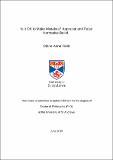Files in this item
Is it OK to make mistakes? : appraisal and false normative belief
Item metadata
| dc.contributor.advisor | Brown, Jessica (Jessica Anne) | |
| dc.contributor.advisor | Snedegar, Justin | |
| dc.contributor.author | Field, Claire Anne | |
| dc.coverage.spatial | 215 p. | en_US |
| dc.date.accessioned | 2020-10-29T11:37:25Z | |
| dc.date.available | 2020-10-29T11:37:25Z | |
| dc.date.issued | 2020-07-27 | |
| dc.identifier.uri | https://hdl.handle.net/10023/20854 | |
| dc.description.abstract | Sometimes we make mistakes, even when we try to do our best. When those mistakes are about normative matters, such as what is required, this leads to a puzzle. This puzzle arises from the possibility of misleading evidence about what rationality requires. I argue that the best way to solve this puzzle is to distinguish between two kinds of evaluation: requirement and appraisal. The strategy I defend connects three distinct debates in epistemology, ethics, and normativity: the debate over how our theories of epistemic rationality should accommodate misleading evidence, the debate over the relationship between complying with requirements and deserving particular appraisals, and the debate over whether normative ignorance can excuse. Part 1 shows how three apparently plausible claims about epistemic rationality generate a puzzle when agents have misleading evidence about what rationality requires. Part 2 solves this puzzle by distinguishing between evaluations of requirement and appraisal and rejecting the idea that one is required to conform to the Enkratic Principle. I argue instead that complying with the Enkratic Principle provides defeasible evidence that the agent should be positively appraised. One of the consequences of this solution is that false normative beliefs can sometimes excuse agents from negative appraisal they would otherwise deserve for violating requirements. Part 3 defends the view that false normative belief can sometimes excuse against the rival views that false normative belief always excuses, and that false normative belief never excuses. I argue that false normative belief can sometimes excuse violations of requirements, when it is the case that the agent has done what it is reasonable to expect of her. | en_US |
| dc.language.iso | en | en_US |
| dc.publisher | University of St Andrews | |
| dc.subject.lcc | BC175.F5 | |
| dc.subject.lcsh | Fallacies (Logic) | e |
| dc.subject.lcsh | Thought and thinking | en |
| dc.title | Is it OK to make mistakes? : appraisal and false normative belief | en_US |
| dc.type | Thesis | en_US |
| dc.contributor.sponsor | Arts and Humanities Research Council (AHRC) | en_US |
| dc.contributor.sponsor | Aristotelian Society (Great Britain) | en_US |
| dc.type.qualificationlevel | Doctoral | en_US |
| dc.type.qualificationname | PhD Doctor of Philosophy | en_US |
| dc.publisher.institution | The University of St Andrews | en_US |
| dc.identifier.doi | https://doi.org/10.17630/10023-20854 | |
| dc.identifier.grantnumber | AHRC Grant #1648463 | en_US |
The following licence files are associated with this item:
This item appears in the following Collection(s)
Items in the St Andrews Research Repository are protected by copyright, with all rights reserved, unless otherwise indicated.

